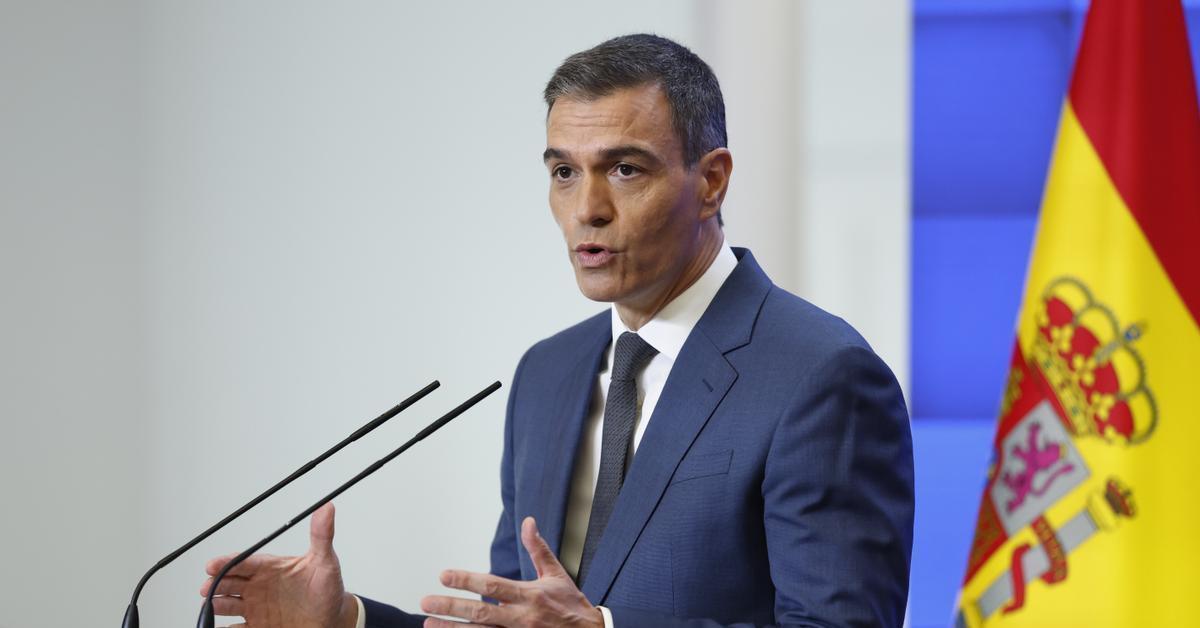
Silence, in politics, is often a bad companion. Those who do not speak do so because they are giving in, because words can make silence worse, or because they are waiting for the right moment. In this case, the resting mode is usually tactical. And everything indicates that what is hidden behind the lack of explanations and details from Pedro Sánchez, the Government and the PSOE regarding the agreement signed with ERC for a Catalan quota, similar to that of Navarra and the Basque Country, is exactly that. And that, although aphasia plays against their interests or produces an intense movement of internal protest, “everything will be better understood when the time comes.”
This is how the socialists justify having allowed the republicans to weave their own narrative this week and that it has become part of the public conversation in such a way that the right has been able to once again raise the scarecrow of Spain is breaking up. There are two milestones on the political horizon that advise caution. The first, the consultation of the ERC membership, has already passed the test. By the skin of its teeth and surely with consequences for the republicans in the electoral space of the independence movement. The second is the investiture of Salvador Illa and until this occurs there is no piece of the puzzle that is completely fitted together.
The agreement is complex and the risk of it being blown up at the slightest change is high. That is why each word is carefully measured, as is the role to be played by the signatories. The PSOE has, for the moment, given up on fighting the narrative to grant ERC the prominence that Junqueras has denied it over the last year and has asked its supporters for time and prudence. In exchange, it has told them that in no case will the solidarity of the regional financing system be put at risk.
What those who have been mulling over the current model for years do admit is that, after more than a decade in force, “it is not revisable” and that a new “fiscal approach” is needed for the whole territory to put an end to the problems of underfunding that several regions complain about. “What is underway is a second decentralisation of the State”, they recognise and a “very complex agreement” that today does not even have the approval of the partners in the coalition government. And this is a reality that the socialists have not hidden from the ERC negotiators at any time. What they did not expect – at least with the forcefulness that has occurred – are the voices from the PSOE itself that have shown themselves to be against what was agreed in the terms that have been known.
The criticism goes beyond Emiliano García Page or Javier Lambán and even the Asturian Adrián Barbón has been emphatic: “We are against the exit of any community from the common regime and we will not support anything that goes against the interests of Asturias”. The president of the Principality is not precisely one of the PSOE barons who can be accused of a lack of loyalty to the Government and neither is he against a federalization of the State, but he is not willing to accept that the new model pivots on the basis of the principle of ordinality and he has conveyed this to Salvador Illa, who these days is working hard to convince the territorial leaders of the PSOE that “nothing is at risk”.
Moncloa and the socialist leadership are clinging to the great political value of an independence group like ERC voting for the investiture of a socialist like Illa, a rupture of blocks that “definitively ends the process”. According to what elDiario.es has been able to gather from some members of the federal leadership and territorial leaders, they have also been informed that what was agreed with ERC “will be extensible” to all the communities that require it and that it is not stated like that in the document, as happened with the removal of the Autonomous Liquidity Fund, because the Republicans demanded that it be like that so as not to arouse reluctance in their bases at the time of the consultation.
The agreement, therefore, would be a kind of “coffee for everyone” like the one José María Aznar agreed with Jordi Pujol to transfer 30% of the IRPF or the one José Luis Rodríguez Zapatero agreed with Artur Más to transfer 50% of the same tax and also the VAT. The consequence would be a tax model different from the current one, whose deficiencies are more than proven. The problem is that only the autonomous communities contributing to the solidarity fund would claim the quota and that, later, it would be necessary to establish with each of them the percentage of solidarity for the regions with fewer resources.
But this is an issue on which, for the moment, it is preferred not to give too many details, beyond the fact that in the case of Catalonia this percentage and the development of the model would be negotiated with Illa, “a socialist committed not only to equality and the redistribution of wealth, but not at all suspected of wanting to end Spain or solidarity between territories,” they say in the Monclovite plumbing.
In any case, the solidarity fee “is a tax and this is not being outside the system”, as has already been established in the public conversation. The debate, for the socialists, is terminological and they do not seem willing to fight it until Illa is invested as president. In fact, María Jesús Montero, the Minister of Finance and probably the socialist who has denied the most times that the PSOE was going to agree on what it finally agreed on, has not made any public statements for a week. Now she will have to engage in educational work like the one Félix Bolaños engaged in when he negotiated the amnesty with Carles Puigdemont’s party.
The difference between the two is that unlike other socialists, the Minister of the Presidency cannot be found in the newspaper archives a single statement against criminal omission, while Montero has a notable history of opposition to a possible Catalan agreement, both as head of the Treasury and when she was once a councillor on the same subject in the Andalusian Government.
ERC is also not immune to the difficulties of getting the agreed model approved by the Spanish Parliament, and not only by the regionalist parties that are part of Sumar but also because the vote of Junts, which was seeking a repeat election in Catalonia and has put all kinds of obstacles in the way of the negotiations between the PSC and Marta Rovira’s party to derail the agreement, would also be in doubt. To comply with what was agreed, therefore, a long process of uncertain outcome is now beginning and “that has not been denied to the Republican negotiators at any time,” the socialists stress.
If the PSOE, even if it doesn’t say so, knows that in colloquial terms it has swallowed a toad with this pre-agreement, ERC is fully aware that its own do too. The socialists’ party is a party that supported the application of Article 155 of the Constitution when Catalonia unilaterally declared independence. “The cost to be paid in any case – says a prominent socialist – is offset by Illa’s presidency,” which shows that Sánchez’s commitment to prioritising his investiture over any other issue was literal. Something that is not fully understood in the rest of the PSOE territories, where the brand lost the majority of regional governments after the 2023 regional elections.
Source: www.eldiario.es

